Please join us for the October session of the Student Research Forum. Students interested in presenting can sign up here.
Guest speaker: Kerrie Carden, Director of Student Ventures at JHTV FastForward
To provide more teamwork opportunities and build bonds among graduate students and postdoctoral fellows, INBT implemented the Student Research Forum. The forum is built upon the collaborative core that INBT was founded on and provides opportunities for students to engage with each other on research topics and other professional aspects of research and training.
Each month during the academic year, the group gathers to hear student presentations on research or a business proposal. The presenters receive feedback from their peer audience on how to refine their research project or proposal. One to two guest speakers from a relevant industry organization is also present to provide feedback to the presenters, but to also discuss other topics with students such as research in industry, a career in industry, and how academia and industry work together. Students can use the time to network with peers they do not normally interact with in the INBT labs. At the end of each semester, those presenters compete in a final competition for a cash prize to use toward their research or proposal.
*The Student Research Forum is for INBT graduate students and postdoctoral fellows only.*
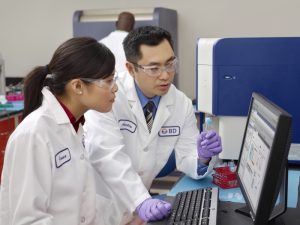
Please join us for our fall information session about our Maters Industry Co-Op program. The program provides students with career training while employed with an industry partner. Students will gain work experience, network, and build technical skills to prepare for a competitive job market. Plus, you will earn a salary and receive college credit during employment.
This program is open to engineering students in Chemical and Biomolecular Engineering, Materials Science and Engineering, and Mechanical Engineering.
Refreshments will be served.
More information can be found on our Maters Co-Op webpage.

Please join us as we welcome guest speaker CAPT (Dr.) Hassan A. Tetteh, MD, MBA, MPA, MS, Health Mission Chief, Department of Defense, Joint Artificial Intelligence Center. Dr. Tetteh will be discussing, “The Future of AI, Health, and Creativity.”
Abstract: An Artificial Intelligence (AI) revolution is not coming; the revolution is already here. AI is fundamentally changing the landscape of healthcare delivery and many leaders are not prepared. A new paradigm of health care delivery is on the horizon. Artificial intelligence, in this context, is defined as intelligent human behavior simulation in computers. Like electricity in the past, AI represents the general-purpose technology (GPT) of our era. With inherent challenges, threats, and opportunities ahead, ‘future-oriented’ strategies should be implemented by leaders that leverage AI to create better, stronger, and more relevant healthcare organizations to care for patients and promote health and wellness in the 21st century and beyond.
Like many other industries, healthcare is undergoing significant change. Five key drivers impact the rapid advance in Artificial Intelligence (AI) technology as it relates to the potential application in healthcare. Computer science’s early limitations in computing power, data sources, and expertise are now mitigated. Today, the difference is the convergence of factors that make the potential for AI more advanced now than in the past. Five key drivers impact the rapid advance in AI technology:
1. Exponential growth in computer power over the past decades
2. Availability of large datasets for machine learning training
3. Machine learning technique improvement
4. Increased commercial and government investment in AI research
5. Use of electronic health records and digital health information
Collectively, the five drivers of AI technology coupled with the abundance of data stored on patients may help to understand disease at a fundamentally better level to facilitate treatment and therapeutics to help patients more effectively and efficiently. This educational program highlights how AI can be specifically leveraged to improve quality across the healthcare enterprise.
Learning Objective 1: Define AI technology platforms, recognize the lexicon of AI terminology, and select the specific AI technologies for practical application within a healthcare organization.
Learning Objective 2: Recognize the risk of not leveraging AI, identify the correct approach to AI, and adopt the essential steps required to achieve transformational change using AI.
Biography: Dr. Hassan A. Tetteh is a US Navy Captain and Associate Professor of Surgery at the Uniformed Services University of the Health Sciences and adjunct faculty at Howard University College of Medicine. He was a Robert Wood Johnson Health Policy Fellow from 2012-13, assigned to the US Congress, Congressional Budget Office, (CBO), and recently served as the Chief Medical Informatics Officer (CMIO) for the United States Navy. Currently, Tetteh serves as the Health Mission Chief for Warfighter Health at the Joint Artificial Intelligence Center (JAIC) in the Department of Defense (DoD), and he is a Thoracic Surgeon for MedStar Health and Walter Reed National Military Medical Center. He leads a Specialized Thoracic Adapted Recovery (STAR) Team, in Washington, DC, and his research in thoracic transplantation aims to expand heart and lung recovery and save lives.
A native of Brooklyn, New York, Tetteh received his BS from State University of New York (SUNY) at Plattsburgh, his MD from SUNY Downstate Medical Center, his MPA from Harvard’s Kennedy School of Government, his MBA from Johns Hopkins University Carey Business School, and his MS in National Security Strategy with a concentration in Artificial Intelligence from the National War College. He completed his thoracic surgery fellowship at the University of Minnesota and advanced cardiac surgery fellowship at Harvard Medical School’s Brigham and Women’s Hospital in Boston.
Tetteh is a bestselling author of four books including: Gifts of the Heart, Star Patrol, The Art of Human Care, and Seven Pillars of Life. He has finished twenty marathons, and delivered the popular TEDx talk, From Death to Life, based on his work in transplant surgery. Tetteh is board certified in thoracic surgery, general surgery, clinical informatics, and healthcare management, and is a Fellow of the American College of Surgeons and Fellow of the American College of Healthcare Executives.
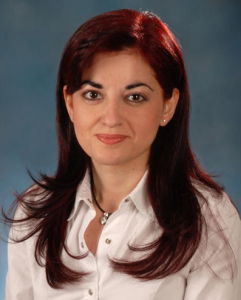
Please join us for our second guest speaker in our Women in Cancer Research Fall Mini Seminar Series, Aikaterini Kontrogianni-Konstantopoulos, and her talk, “Giant Obscurins: Novel Tumor and Metastasis Suppressors in Breast Epithelial Cells.”
Abstract: Obscurins, encoded by the single OBSCN gene, are giant (720-860 kDa) cytoskeletal proteins with scaffolding and regulatory roles. The OBSCN gene is highly mutated and/or epigenetically modified in multiple types of cancer, including breast cancer. Consistent with this, Kaplan-Meier-Plotter data sets have indicated that low OBSCN levels correlate with significantly reduced survival and relapse-free survival in breast cancer patients. Our research focuses on interrogating the impact of obscurins’ loss from normal breast epithelial cells, the delineation of the molecular alterations that take place downstream of obscurins’ loss, and the development of novel and effective ways to restore obscurin expression and/or functionality.
Biography: Aikaterini Kontrogianni-Konstantopoulos research focuses on the elucidation of the roles of cytoskeletal and membrane-associated proteins as structural and signaling mediators. Using the muscle and epithelial cell as model systems, my laboratory has pioneered the molecular and functional characterization of the obscurin subfamily and its binding partner Myosin Binding Protein-C slow in health and disease.
In 2007, she joined the Department of Biochemistry and Molecular Biology at the University of Maryland School of Medicine as Assistant Professor in the tenure track. Using the muscle and epithelial cell as model systems, her laboratory has pioneered the molecular and functional characterization of major cytoskeletal and membrane-associated proteins as structural and signaling mediators in health and disease.
From Polymers to DNA, Self-Assembled Nanomaterials that Target Cancer
Self-assembly of polymers or biological molecules is an attractive method for engineering supramolecular biomaterials for biomedical applications. Kokkoli’s research focuses on the design and characterization of novel amphiphilic molecules that have the tendency to self-assemble spontaneously in different structures in water. She will discuss two examples, the design and characterization of a new thermosensitive and biodegradable polymer that can be used for the local delivery of targeted nanoparticles or different therapeutics, and the assembly of ssDNA-amphiphiles into nanotubes used to target glioblastoma multiforme (GBM), in vitro and in vivo in an orthotopic mouse model of GBM, in the absence of any targeting moiety.
Efie Kokkoli, a targeted drug delivery specialist, is a professor in the Chemical and Biomolecular Department at the Whiting School of Engineering. Her research focuses on the areas of DNA nanotechnology, multi-targeted gene and drug delivery, and the design of biopolymers and responsive hydrogels. With the goal of directing nanoparticles capable of carrying cancer drugs to tumor sites while sparing non-cancerous areas, her group concentrates on designing biomaterials ranging from polymeric nanoparticles to DNA nanotubes that respond best under certain conditions, like temperature or pH, and have specificity for cancer cells.
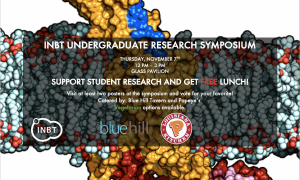
Please join us for our 5th Annual INBT Undergraduate Symposium on November 7th, 2019 from 12:00 pm – 3:00 pm.
Agenda
12:00 pm – 1:00 pm – Poster session 1
1:00 pm – Lunch served
1:30 pm – 2:30 pm – Poster session II
2:30 – 3:00 pm – Award presentation
Attendance
Registration is required for poster presenters. Register your poster and learn the requirements here by October 24th.
There will be four chances to win a poster prize!
Registration is not needed to attend the symposium.
If you have questions, please email inbt.undergraduate@gmail.com.
Want to learn more about the symposium? Read about last years’ symposium in our news section.

Please join us for an information session on our International Research Experience for Students (IRES) program.
IRES fellows perform research on bioengineering projects at imec in Leuven, Belgium. International cooperation shows students the importance of collaborations in addressing global challenges in science and technology.
Imec is a government research institute working with universities, industry, and governments labs. They specialize in microelectronics and have world-class laboratories and manufacturing capabilities. The program is funded by the National Science Foundation and supports 3-5 Johns Hopkins students to work at imec where they will learn how to design, fabricate, and test a wide range of biomedical devices.
Learn more about the program on our website and student blogs website. This program is open to undergraduate and graduate students.
Refreshments will be served.
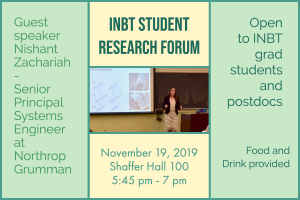
Please join us for the November session of the Student Research Forum. Students interested in presenting can sign up here.
This month’s guest speaker is Nishant Zachariah, PhD – Senior Principal Systems Engineer at Northrop Grumman. He received his MSE in biomedical engineering Johns Hopkins University and his PhD at Georgia Institute of Technology in electrical engineering.
To provide more teamwork opportunities and build bonds among graduate students and postdoctoral fellows, INBT implemented the Student Research Forum. The forum is built upon the collaborative core that INBT was founded on and provides opportunities for students to engage with each other on research topics and other professional aspects of research and training.
Each month during the academic year, the group gathers to hear student presentations on research or a business proposal. The presenters receive feedback from their peer audience on how to refine their research project or proposal. One to two guest speakers from a relevant industry organization is also present to provide feedback to the presenters, but to also discuss other topics with students such as research in industry, a career in industry, and how academia and industry work together. Students can use the time to network with peers they do not normally interact with in the INBT labs. At the end of each semester, those presenters compete in a final competition for a cash prize to use toward their research or proposal.
*The Student Research Forum is for INBT graduate students and postdoctoral fellows only.*
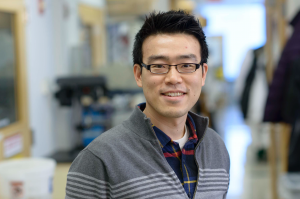
“Engineering Platforms for Investigating Cancer Biomarkers: Exosomes and Metabolism”
Sangmoo Jeong’s research is mainly focused on developing a novel analytical platform, termed hyperpolarized micro-NMR, to study metabolism in clinically relevant models, such as organoids or stem cells. Using the in-house 3D printer and microfluidics, he has also been developing a NMR-compatible micro-bioreactor system to monitor metabolic changes in cancer cells in real time.
Cancer cells change their phenotypes, proliferating in otherwise healthy environments. Jeong has developed sensitive analytic tools to identify cancer biomarkers and to develop diagnostic and therapeutic strategies. Jeong will discuss his two novel engineering platforms which are significantly beneficial for analyzing cancer exosomes and metabolism: iMEX (intergrated Magneto-electrochemical EXosome sensing) and HP micro-NMR (HyperPolarized micro Nuclear Magnetic Resonance sensing). This seminar will also feature a discussion surrounding his independent lab’s interdisciplinary research directions.
The INBT is collecting donations for the Hopkins Food Pantry. The Hopkins Pantry serves to tackle food insecurity at Johns Hopkins by providing students, staff, and faculty with an alternative resource. They accept donations of non-perishable, non-expired food products, and hygiene products.
Food: peanut butter; jelly; granola bars/breakfast bars; nuts and seeds (in sealed packages/ containers); dried fruits; canned pasta, soup, tuna, and vegetables; cereal (large boxes or individual cups); oatmeal; crackers; rice; pasta; pasta sauce; ramen; dried/ canned beans; coffee (instant); boxed meals, ready-to-eat meals.
Toiletries: toilet paper, toothbrush, shampoo, conditioner, body wash/soap, deodorant, feminine
hygiene products


